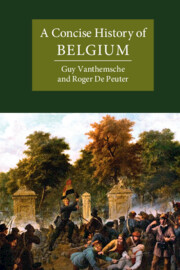Book contents
- A Concise History of Belgium
- Cambridge Concise Histories
- A Concise History of Belgium
- Copyright page
- Dedication
- Contents
- Figures
- Maps
- Acknowledgments
- Note on the Text
- Introduction
- 1 Earliest Times
- 2 The Era of the Frankish Kingdoms
- 3 The Origins of the Medieval Principalities
- 4 Unifying the Netherlands: The Burgundy–Habsburg Period (1384–1555)
- 5 The Spanish Netherlands (1555–1700/1713)
- 6 The Austrian Netherlands (c.1700–1780)
- 7 The Formation of a New Nation-State (1780s–1830)
- 8 The Consolidation of a Bourgeois Regime (1831–1880s)
- 9 The Belgian Nation-State at Its Height (1880s–1945)
- 10 The Metamorphoses of a Nation-State (from 1945 to the Present Day)
- General Conclusion
- Appendix: List of Rulers, Sovereigns and Heads of State (1419–Present) and of Governors General (1507–1794) of the Southern Low Countries and Belgium
- Further Reading
- Index
1 - Earliest Times
From Prehistory to the End of the Roman Period
Published online by Cambridge University Press: 16 March 2023
- A Concise History of Belgium
- Cambridge Concise Histories
- A Concise History of Belgium
- Copyright page
- Dedication
- Contents
- Figures
- Maps
- Acknowledgments
- Note on the Text
- Introduction
- 1 Earliest Times
- 2 The Era of the Frankish Kingdoms
- 3 The Origins of the Medieval Principalities
- 4 Unifying the Netherlands: The Burgundy–Habsburg Period (1384–1555)
- 5 The Spanish Netherlands (1555–1700/1713)
- 6 The Austrian Netherlands (c.1700–1780)
- 7 The Formation of a New Nation-State (1780s–1830)
- 8 The Consolidation of a Bourgeois Regime (1831–1880s)
- 9 The Belgian Nation-State at Its Height (1880s–1945)
- 10 The Metamorphoses of a Nation-State (from 1945 to the Present Day)
- General Conclusion
- Appendix: List of Rulers, Sovereigns and Heads of State (1419–Present) and of Governors General (1507–1794) of the Southern Low Countries and Belgium
- Further Reading
- Index
Summary
Dating back to Celtic times, the words “Belgium” and “Belgians” are indeed very ancient, but this antiquity is wholly fallacious if one wants to understand the genesis of the contemporary nation-state that carries this name. These terms do not, in any way, reflect some remote historical antecedents of the country founded in 1830. In the nineteenth and early twentieth centuries, however, many Belgian patriots – historians, politicians, artists, teachers, and other opinion makers – were enthralled by the abundant mentions of these “Belgians” in Julius Caesar’s De Bello Gallico, the well-known report of his bloody conquest of Gaul. In their eyes, these references clearly proved the age-old existence of a “Belgian identity,” or at least of some of its constitutive elements. Of course, nowadays no one seriously refers to “Ancient Belgians” as the “ancestors” of the contemporary people of this nation. But that does not mean that these early times are irrelevant. On the contrary: the prehistoric, Celtic, and Roman legacies played a role in shaping the territories that were to form today’s Belgium.
- Type
- Chapter
- Information
- A Concise History of Belgium , pp. 16 - 42Publisher: Cambridge University PressPrint publication year: 2023

